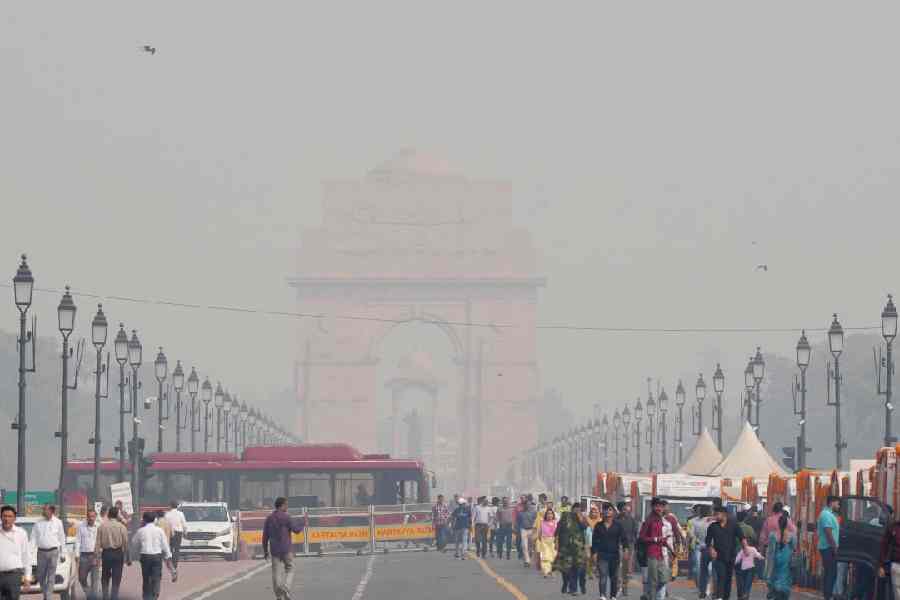With Delhi schools being shut due to pollution yet again, several parents have said that virtual learning is not as effective as physical classes and urged the government to find a permanent solution.
While some parents rued the lack of availability of necessary equipment required for online classes, others suggested that the students must be informed in advance about the measures in store once the air quality index (AQI) starts to dip to avoid the abrupt shift to virtual learning.
"We have been neglected. The issue of pollution has persisted in Delhi for many years now and nothing has been done to resolve it. Online classes are not a solution because there are many students who lack the equipment necessary for online mode of learning," Ajit Mishra, the father of a class 2 student, told PTI.
A parent of a class 6 student at Kendriya Vidyalaya in Delhi Cantonment, Raj Kumar Kanojia, said virtual learning is not equivalent to physical classes as, unlike regular school days, only one to two classes are held when they are shifted to the online mode.
"The important question is, are online classes conducted properly? Parents leave their phones at home and go to work and when they return, they realise that just one or two classes were held in the day," Kanojia told PTI.
"Pollution cannot be controlled by keeping children at home. The government must take concrete steps and reconsider its policies so that there are no unnecessary holidays or online classes," he added.
All schools in Delhi have been directed to suspend physical classes, except for classes 10 and 12, until November 10 in view of rising pollution levels, Environment Minister Gopal Rai announced on Monday.
Pollution levels in Delhi marginally dipped on Tuesday morning and were recorded in the "very poor" category after five consecutive days of severe air quality. The national capital's AQI was 394 at 4 pm on Tuesday, a marginal improvement from 421 recorded at 4 pm on Monday.
Despite the marginal dip, the concentration of PM2.5 -- a fine particulate matter capable of penetrating deep into the respiratory system and triggering health problems -- exceeded the government-prescribed safe limit of 60 micrograms per cubic metre by seven to eight times in the capital.
It was 30 to 40 times the healthy limit of 15 micrograms per cubic metre set by the World Health Organization (WHO).
Another parent, Nishant, whose child is a primary class student at the Indraprastha International School in Dwarka said the government should inform the schools in advance about the steps that it plans to take as the pollution levels begin to rise.
"Schools should be informed about the pollution situation and subsequent measures in advance so that they can inform the students on time to avoid the abrupt change in the mode of learning," he said.
"The government must take steps to stop stubble burning and there should be a district-wise environmental task force to look after pollution-related issues and suggest other environmentally friendly alternatives," Nishant said.
Earlier, Delhi Parents' Association president Aparajita Gautam had told PTI that the problem of pollution arises in the national capital every year which leads to school closures therefore, the government should introduce a 'pollution vacation' in the yearly holiday calendar for students.
"On one hand this is a welcome step because the students were suffering and on the other, parents are frustrated because we witness this situation every year in Delhi. How long will the government keep shutting schools for pollution? This just shows that they have failed to implement anti-pollution norms," she said.
"The government should introduce 'pollution vacation' in the yearly holiday calendar from now on," Gautam told PTI.
She said there have been cases of children falling sick and facing breathing and allergic problems due to rising levels of pollution in the city.
Speaking about the issue, Bhavreen Kandhari, an environmentalist and a member of 'Warrior Moms' -- a network of mothers across India demanding clean air for children -- said it is crucial for governments to consider alternative solutions to the problem of air pollution, rather than resorting to the "drastic measure" of shutting down schools.
"Air is an omnipresent entity surrounding us at all times and making it impossible to escape its effects. While a select few fortunate individuals might have the means to partially and temporarily shield themselves from air pollution, the vast majority of people find themselves living in overcrowded one-room homes or slums, where clean air is a luxury they can seldom afford," Kandhari told PTI.
"In light of this, it becomes crucial for governments to consider alternative solutions to the problem of air pollution, rather than resorting to the drastic measure of shutting down schools," she added.
She further said that by addressing the root causes of air pollution and implementing effective strategies to improve air quality, authorities can ensure a healthier environment for all, especially for those who are most vulnerable to its adverse effects, such as young children.
Except for the headline, this story has not been edited by The Telegraph Online staff and has been published from a syndicated feed.










